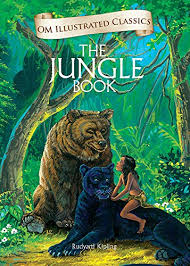Rudyard Kipling
Listen to the Recess! Clip
| Author | John Cech |
| Air Date | 12/29/2004 |

Rudyard Kipling Transcript
Its the birthday this week of the author, Rudyard Kipling. He was born in Bombay, India, in 1865, to British parents who had been posted to the subcontinent, then part of England’s colonial empire. Kipling would make India the setting of dozens of his short stories and a number of his most famous works for children, including Kim and The Jungle Book. The latter novel, published in 1894, about Mowgli, a boy who grows up with the wolves and eventually becomes Master of the Jungle, was so popular that Baden Powell, the founder of the Boy Scouts, modeled his wolf-cub “dens” on those in Kipling’s story.
The ruddy-cheeked masculinity that Kipling drew on so often in his books, was part of the Zeitgeist that was in the air at the turn of the 19th century. And Kipling’s muscular, hale fellow use of it made him enormously famous and wealthy. Kipling would go to that well again and again. In his novel about the fishermen of the Grand Banks, Captains Courageous, he extolled the ennobling values of being “licked into shape” by discipline, when he dropped a rich boy overboard during a luxury cruise, to be rescued, befriended, and schooled in the important virtues of life by the crew of a fishing schooner out of Gloucester, Massachusetts.
Though he went on to win the Nobel Prize in 1907, becoming the first English writer to do so, Kipling’s reputation has been in a kind of limbo for years, in part because of the colonialist attitudes that percolate through much of his work.
But read Kiplings loving letters to his children, collected in a volume aptly titled O Beloved Kids, and you will find in them a remarkable portrait of a devoted father who adored his children who, in their turn, inspired their dear Daddoo to tell and later to write, arguably his best work for them: the 1902 Just-So Stories those extraordinarily inventive myths about the origins of language and elephant trunks, the solitary nature of cats, and the solution to the mystery of the camel’s hump. Kipling was making it all up for them, his “dear people,” as he called them for Josephine, his daughter, who died at the age of six, the grief of whose loss almost stopped him from continuing with the stories; for his son, John, who would become a young officer and be lost in the trenches of World War I (Kipling could not forgive himself for having pushed the lad into the service); and for his second daughter, Elsie, who would marry but had no children of her own. Kipling drove himself in his work, relentlessly till his death in 1936, in the end trying to hold off the question that he had posed in one of his own poems about the young men killed in the Great War: “But who shall return us the children?”